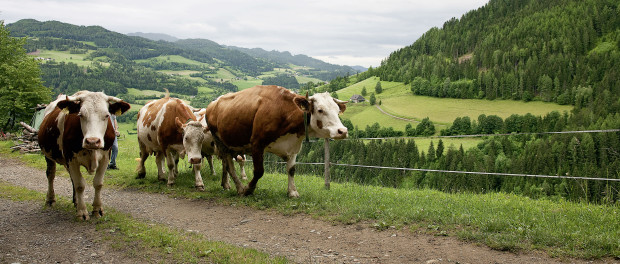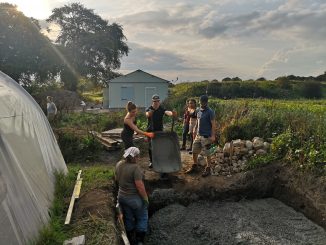Two new studies published today, 16 February 2016, in the British Journal of Nutrition shows organic milk and meat contain around 50% more beneficial omega-3 fatty acids than non-organic. In addition to organic milk and meat, the nutritional differences also apply to organic dairy like butter, cream, cheese and yoghurt.

The papers, now the largest systematic reviews on this topic, were lead by Newcastle University and an international team of experts. It f0llows on from a 2014 study by the same team which found similar positive results for crops.
Key findings:
- both organic milk (dairy) and meat contain around 50% more beneficial omega-3 fatty acids than conventionally produced products
- organic meat had slightly lower concentrations of two saturated fats linked to heart disease
- organic milk and dairy contains 40% more conjugated linoleic acid (CLA) – CLA has been linked to a range of health benefits including reduced risk of cardiovascular disease, certain cancers and obesity, but evidence is mainly from animal studies
- organic milk and dairy contains slightly higher concentrations of iron, Vitamin E and some carotenoids
- organic milk contains less iodine than non-organic milk (an issue which organic farmers have started to address with mineral supplements)
Newcastle University’s Professor Carlo Leifert, who led the studies, said:
“People choose organic milk and meat for three main reasons: improved animal welfare, the positive impacts of organic farming on the environment, and the perceived health benefits. But much less is known about impacts on nutritional quality, hence the need for this study.”
Earlier research from Newcastle University also published in the British Journal of Nutrition in 2014 found organic crops are of a much higher nutritional quality than their non-organic counterparts. The peer reviewed research, a ‘meta-analysis’ of 343 previous studies found significant differences between organic and non-organic farming.
The research presented strong evidence that switching to food produced using organic standards can lead to increased intake of nutritionally desirable antioxidants, without increased calories, as well as a reduced intake of potentially harmful cadmium and pesticides.
From study author Chris Seal: “Omega-3s are linked to reductions in cardiovascular disease, improved neurological development and function, and better immune function.”
“Western European diets are recognised as being too low in these fatty acids and the European Food Safety Authority (EFSA) recommends we should double our intake.”
“But getting enough in our diet is difficult. Our study suggests that switching to organic would go some way towards improving intakes of these important nutrients.”
The Study Centre where the researchers are based (Nafferton, part of Newcastle University) point out that this study was in fact inspired by the infamous UK FSA study conducted by Dangour et al 2009:
In 2009 a widely publicised FSA-sponsored systematic literature review (Dangour et al. 2009) concluded there was no evidence of significant differences in nutritional composition between organic and conventional crop and livestock products.
This conclusion contradicted most results of (a) literature reviews, (b) controlled field experiements, (c) farm surveys and (d) supermarket surveys that were carried out by scientists from across Europe (included in the QualityLowInputFood consortium).
The NEFG team therefore initiated a programme of systematic literature reviews and meta-analyses of published data on composition differences between organic and conventional crops, meat and milk. These reviews/analyses were supported by both the EU (via the QualityLowInputFood, NUE-crops and LowInputBreeds projects) and the Sheepdrove Trust.”
They continue:
“This FSA study, however, based its conclusions on only 12 comparative papers on milk and combined data from meat and milk composition in the analysis.
Interestingly, Dangour et al. reported a trend towards significantly higher levels of polyunsaturated and omega-3 fatty acids in organic livestock products (meat and milk) in their report to the FSA, but this was not mentioned in the published paper or press release.
Dr Gavin Stewart, a Lecturer in Evidence Synthesis and the meta-analysis expert in the Newcastle team, added: “The much larger evidence base available in this synthesis allowed us to use more appropriate, powerful statistical methods to draw more definitive conclusions regarding the differences between organic and conventional milk and dairy products”
But is all of this relevant? Aren’t there better sources for these nutrients? The New York Times reports that a significant souce of these nutrients, fish, is rapidly declining. They add commentary via
Richard P. Bazinet – professor of nutritional sciences at the University of Toronto who was not involved with the research.
“perhaps encouraging people to switch to organic meats and milk would be “a way to kind of get at them with the foods they’re already eating.” Observational studies suggested that adding 200 milligrams a day of omega-3s to an average diet should yield health benefits. Switching to organic beef would add about 50 milligrams. “Eating one grass-fed beef serving per day is not going to do it…”but if combined with a couple of glasses of organic milk, “it should make a difference,” Dr. Bazinet said. “That would be the hypothesis“.
For more on the new 2016 meta analysis see here
For more from the Soil Association see here
The Studies
“Higher PUFA and omega-3 PUFA, CLA, a-tocopherol and iron, but lower iodine and selenium concentrations in organic bovine milk: A systematic literature review and meta- and redundancy analysis”. Srednicka-Tober et al. 2016. British Journal of Nutrition.
“Composition differences between organic and conventional meat; a systematic literature review and meta-analysis”. Srednicka-Tober et al. 2016. British Journal of Nutrition.






1 Trackback / Pingback
Comments are closed.